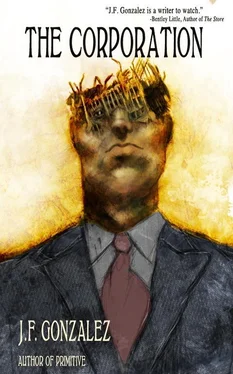Michelle thought about this before she answered. “I suppose in a way there’s more of that bullshit workaholic mentality. The attitude that you have to stay at the office for twelve hours a day and work weekends. There was some of that when I first started working, but it seems more prevalent now.”
Alan nodded. “Anything else?”
Michelle frowned and thought about it some more, quickly traveling down memory lane. “I’ve noticed less company loyalty toward their employees and vice versa. Benefits packages being cut, CEO salaries going higher, wages remaining stagnant while inflation rises. But that’s happening everywhere.”
“Anything else you can think of?” Rachel asked from the back-seat. “Anything in the range of personal development issues or Human Resources stuff?”
“No,” Michelle said, suddenly stopping herself in mid-sentence as a thought came to her. “Well, actually I have noticed disapproval of taking time off. You know… vacations and stuff. Calling in sick. That kind of thing.”
Rachel and Alan nodded. “Go on,” Alan prodded.
“What does this have to do with—”
“It has a lot to do with what we’re up against,” Alan said, his features grim.
Michelle regarded them both, hoping to see if there was just the slightest chance—just the slightest—that they were mad. There wasn’t. She could read it in their faces, in their eyes. They were dead serious and that made her nervous. “I don’t know,” she said, her breath coming out in a whoosh. “There’s so much emphasis now on… devoting yourself to the company you work for, being loyal to them and identifying yourself with them, and you don’t get much in return. It used to be that you could get a good position with a good company and stay there forever. Your job might not always be secure, but your position with the company always was if you were a good employee. If there were cutbacks, they tried to find a way to keep you employed somehow. Those days seem to be gone.”
Alan nodded, and when she was finished he leveled his gaze at her. “You don’t know much about my background, or Rachel’s for that matter. Rachel’s history is similar to yours.” He turned to Rachel. “Care to indulge her?”
“I barely knew my parents,” Rachel said, addressing Michelle directly. “I’m only twenty-five; my mom was twenty-three when she got pregnant with me. She was working for a huge financial planning firm in Chicago and met my father there. He took off when he learned my mom was pregnant, so I never met my natural father. According to my research, my mom was normal during the first three or four years of my life. I barely remember her; all I get are images, brief snapshots or five minute movie reels in my head of when she was my mother. My real mother.” There was a sense of loss in her voice, a heart-breaking sense of sadness that reminded Michelle of her own losses—the lack of her parents love and attention, the loss of Alanis. “When I was four she went through a management training program in an attempt to rise through the ranks at work so she could better provide for me. That’s when she stopped being my mom—she became more absorbed in work. She stopped paying attention to me, was hardly around when I was growing up. She met a guy at work and he moved in with us. He was just like her; very driven, very into his work. They always brought their work home, and I was mostly raised by my grandparents and my uncle Stephen and his wife Shelly. My mom and her boyfriend, whom she later married, provided food and a roof over my head, but that was it. She… acted like a mother whenever she had to show up for a parent-teacher conference or something, but she wasn’t my mother. She started changing drastically when I was five, and by the time I was ten she wasn’t the same woman. The more I tried to remember her from before she changed, the more that image started slipping away. It got to the point that by the time I was in Junior High, I didn’t realize my mother had once been a vibrant person.”
Rachel dragged on her cigarette. “To make a long story short, I was extremely rebellious as a teenager. I got sent to Juvie and later graduated from high school through a GED program. I went to tech school to become an html programmer and got a job working at the same company my mother worked at. Weird coincidence, huh? I tried establishing a relationship with her and for a while I thought it might work. We had something in common now—we worked for the same employer—but whenever I tried to arrange mother-daughter things, my mom always had an excuse, and it always involved work. She just wouldn’t take the time to relax and enjoy the finer things in life. I asked her once why she worked so much, why didn’t she take a vacation or something, and she said, ‘Why would I want to take a vacation? This is what I do .’
“Anyway, that’s when I noticed differences at work. That some people were exactly like my mother and others were more normal, more… you know… they did their jobs, then they went home and had a life. I started noticing this more and more at other companies—I went through five jobs from the time I got my technical school training done till I finally dropped out of the corporate rat race—and I got interested in learning about these people’s lives. I’d always had a diary, so I started jotting down my observations, people’s names, where they worked, what their personalities were like. One day I compared everything.” Rachel fixed Michelle with an intent stare. “And what I found was that twenty percent of all the people at the companies I worked at were exactly like my parents. And that Corporate Financial Consulting was always in some way involved with my employer.”
This is the worst conspiracy theory I’ve ever heard , Michelle thought. “What about other consulting firms? Deloitte and Touche? Ingram Micro? Surely they were doing business with your employers as well?”
“Not all of them, and not all at the same time,” Rachel said. “Deloitte and Touche was only brought in by two of my employers for some short-term project. Ingram Micro I never worked with. There was one firm—I can’t remember their name—but they were involved on a long-term project with one company I was at. Corporate Financial was working with all five of my employers during my stints with them. I even got to see it first hand.”
“See what first hand?”
“How they get you.” Rachel smoked her cigarette down to the filter and stubbed the butt out in an ashtray set along the back panel of the island between the front bucket seats. “They were brought in at Graham Electronics, the last company I was at, for five months after I started. Graham was a great place to work when I started. Of all the companies I was at, there was less bullshit at that one, even among the executives. They were all very cool, very down to earth, very great to work with. Sure, there were some people there who were all gung-ho for the company and who brown-nosed certain higher-ups, but you’ll get that anywhere, in any social situation. Two months after Corporate Financial started doing some work for them, it got worse. A glass ceiling seemed to appear beneath the upper management level seemingly overnight. Certain middle-managers became more company oriented, less friendly, more… dedicated I guess you might say. I noticed the change immediately; I didn’t just roll off the tomato cart yesterday. I sort of hunkered down in my cubicle, did my work as I was told, and observed. And what I saw was pretty scary.”
“And what was so scary?” Michelle asked.
“By my count, ten percent of the people I knew at Graham turned into corporate zombies. Literally. The change was gradual—so gradual that the casual observer wouldn’t recognize it. I’d been seeing the signs the last five years, though, and I paid attention. People I used to talk to at breaks and lunches about anything in the world now only wanted to talk about work. One of my friends, a woman named Carol Williams, used to tell me about her husband and her child all the time. We talked about movies, books, music, stuff on the news. She was very cool. We did our work, talked about office politics and our work in general, but it was never obsessive. Carol got obsessive, though. I asked about her daughter once and Carol looked at me as if she didn’t know what I was talking about. When I pressed her there was this light in her eyes that seemed to suddenly turn on, as if a switch was being thrown. She gave me a very basic answer and that was it; that was not like her. She could gab for hours about her daughter, but on this day she just answered the question and then asked me about the project I was working on.”
Читать дальше












